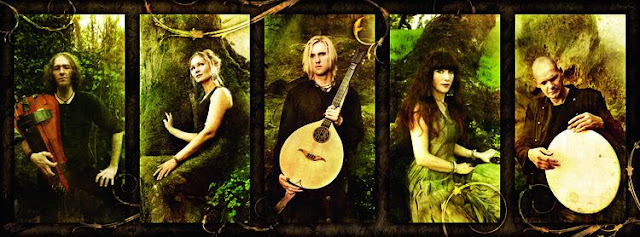FAUN: More than a goat-man
Today's article is about the German band Faun, and their unique style that mixes modern music with old, medieval, Celtic and Nordic folk.
Faun is a German band from Gräfelfing, Munich, which mixes pagan folk music with medieval music. It was formed in 1998 by Oliver Pade, Birgit Muggenthaler, Elisabeth Pawelke and Fiona Rüggeberg.
Faun was formed in Germany in 1998 and since then has had some changes in his members. Of the six musicians who currently make up the band, only two are present from the start: Oliver S. Tyr and Fiona Rüggeberg. Rüdiger Maul and Niel Mitra entered 2004, Stephan Groth in 2012 and Katja Moslehner in 2013. Most members play more than one instrument, bringing a great diversity to the sound of the band.
Since the formation, 9 studio albums have been released and the band has been nominated three times for Echo, which is the biggest musical award in Germany. In their tours, the band has done different types of performance: from acoustic concerts in theaters for sitting people, to big concerts at festivals, with big drums and lights shows (the kind they'll most probably do).
The most difficult part about talking about Faun is defining the style, first, because the the band's style has changed a lot over time and also because they are reluctant to fit into a label given the great melting pot of influences I mentioned in the first paragraph of text. A classification often attributed to them is Pagan Folk. I'll tell you a bit about it, but first of all, talking about Faun is an opportunity for an interesting reflection on the folk music scene itself:
Folk Music
Folk music is one that has some relation to the tradition of a particular culture, such as when using traditional instruments or speaking of legends, fables and customs of a people. It is true that interest in European folk music has always expressed interest here in Portugal, which is not surprising given the great influence of various European peoples in shaping our culture.
Folk metal (a mixture of folk music and heavy metal) has somehow paved the way for European folk music, and the medieval events that emerged in the last 10 years (more or less) ended up constituting an audience both for folk metal bands and for more traditional folk music bands, so that today folk music, folk metal (and some other strands of the metal as well) in medieval events it almost confusing due to the awesome variety!
Faun is one of the most recognized names in folk music in Europe. In fact, many bands admire Faun as one of their influences. The idea of Faun having so many tours was something almost unimaginable ten years ago, but today it is possible thanks to this public that was formed.
Faun's Pagan Folk style
In an interview, Oliver, the band leader, said:
"We still haven't decided what to call our style. Sometimes we call pagan folk, sometimes folk Celtic, Scandinavian, Nordic, or just call it medieval music. We mix all these influences into our shows and CDs. "
The band's own name comes from the Faun creature, present in Greco-Roman mythology. According to the band, the figure of the Faun, as called by the Romans, or Satyr, as called by the Greeks, is often described as a forest spirit, which serves to denote the connection of musicians with nature.
Their songs range from melancholic ballads to lively songs for dancing. Their instruments include Celtic harp, Swedish nyckelharpa, hurdy-gurdy, bagpipes, cittern, flutes and many others.













